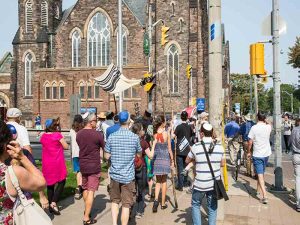The upscale Bloor Street West shops selling designer shoes, handbags and jewelry soon give way to highrise apartments, nondescript University of Toronto buildings and the Toronto Baha’i Centre. It’s not a neighbourhood normally associated with Christian worshippers welcoming their new Jewish tenants.
But that was the scene on the downtown stretch last Sunday morning when the City Shul left its cramped Harbord Street home and moved a few blocks north into the Bloor Street United Church at Huron Street.
The scene was boisterous as the shul’s three Torahs were paraded along Harbord Street beneath a tallit hoisted as a canopy, accompanied by a klezmer band and singing and cheering from about 75 congregants.
Once at the 127-year-old church, shul members were greeted by an equal number of churchgoers, and Rabbi Elyse Goldstein, spiritual leader of the City Shul, affixed a mezuzah to a doorpost.
The more spacious church offers the synagogue a sanctuary that seats some 850 worshippers, a social hall, office space and generally more elbowroom. The synagogue will pay rent for its new quarters.
In its new home, “City Shulers can pray facing east,” assures the synagogue’s website.
The larger sanctuary will also allow for a play area, where parents can play with their kids during services.
‘Relations between the organized Jewish community and the United Church of Canada, the country’s largest Protestant denomination, have been strained over the past few years’
The congregation’s Hebrew school, with its 80 pupils, will remain just around the corner at Huron Street Public School.
Opened in 2012 as the first Reform congregation south of Holy Blossom Temple, the City Shul soon outgrew its home in the Wolfond Centre for Jewish Campus Life, located on the University of Toronto campus. Though the chapel seated only about 60 people, the synagogue grew to some 250 family members.
“On Saturdays, we were out the door. We had people in the hallway,” Rabbi Gold- stein told The CJN. The basement, too, would fill up if there were a bar mitzvah.
“But we really felt it was time to give that building back to (U of T) students,” Rabbi Goldstein said.

This will be the fourth consecutive year the synagogue will hold its High Holiday services at the church. Rabbi Goldstein was slated to deliver her Rosh Hashanah sermon this year on the significance of the permanent move.
It’s not the first time a synagogue and a non-Jewish congregation have agreed to share a prayer space. In 1996, Temple Shalom in Waterloo, Ont., began sharing a sanctuary, and management duties, with Westminster United Church.
And in 2004, Beth Israel Synagogue in Peterborough, Ont., now the Jewish Community Centre of Peterborough, agreed to share its building with the Peterborough Unitarian Fellowship.
READ: RABBIS JOIN OTHER FAITH LEADERS IN BUILDING HOUSES FOR NEEDY
Rabbi Goldstein said she’s fully aware of the two different religious traditions at work. “I don’t think they’re going to come and try to convert us,” she said with a chuckle.
But from a spiritual point of view, she stated, “If I’m in a room where people have spiritual strengths, I can draw from those strengths without having to have the same dogma or theology. I would rather be in a church than an office building, because the (church) itself is imbued with a kind of spiritual seriousness and joy.
“We have to be in partnership with each other.”
She said the synagogue will have a portable Aron Kodesh – an antique armoire on wheels – while a “gorgeous” cover operated by a pulley will conceal the church’s cross on Shabbat and holy days.
Bloor Street United is “delighted” by the City Shul’s move to its building, according to Rev. Martha ter Kuile, the congregation’s minister. She said church members unanimously approved the move.
“This is a great opportunity to listen to one another and learn from one another, while serving the larger community,” Rev. ter Kuile said.
Relations between the organized Jewish community and the United Church of Canada, the country’s largest Protestant denomination, have been strained over the past few years, owing to the church’s adoption of measures favouring the boycott, divestment and sanctions (BDS) campaign against Israel.
In 2013, it launched its “Unsettling Goods” campaign, urging members to avoid all consumer products manufactured in Israeli settlements.
In 2015, it approved “ethical divestment” from companies that “derive substantial financial benefit or that contribute significantly to furthering the Israeli occupation of Palestinian territory,” according to a church statement.
However, the United Church “does not describe itself as part of the global Boycott, Divestment and Sanctions campaign,” according to a statement to The CJN. “Our focus is clear: support for ending the Israeli occupation of Palestinian territories.”

Many Church members and religious leaders have spoken out against the campaigns.
At Bloor Street United, “there is a range of views on how best to contribute toward a just peace in the region,” Rev. ter Kuile said. The congregation has no policy statement of its own, “apart from that of the United Church of Canada.”
Rabbi Goldstein sees it this way: “We know there are a plurality of voices around Israel, both in the Jewish community and in the non-Jewish community. We know the United Church may have a certain official stand, but we also know there are people within the United Church who oppose that stand.
“We are very clear of our position around Israel,” she went on. “We do not support BDS. We’ll never waver in that. And the Church is very aware of our stand. We see this is an opportunity for dialogue with people who might benefit from our point of view.”
As for potential conflicts when it comes to religious holidays, she said, “We’ve talked about that and aren’t worried.”







